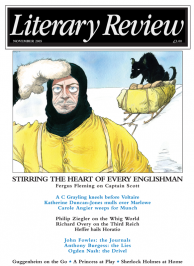John McDermott
A Genuine Fake
The Real Life of Anthony Burgess
By Andrew Biswell
Picador 418pp £20
Angers, in the Loire Valley, is a pleasant little town with two modest claims to notice: it is twinned with Wigan, and it houses the Anthony Burgess Center. Such an arrangement might well have pleased Burgess. First, it has an echo of the Catholic Lancashire he bogusly made so much of and fled from, opting like Joyce for silence (well, hardly that), exile and cunning (plenty of that; secondly, it locates him in a Europe far removed from the England where he suffered what he called the ‘malevolence’ of the literary establishment. The rest of his literary remains are scattered, just as promiscuously, in Manchester, Texas and elsewhere.
There is a growing literature about Burgess, and much of it is non-British in origin, which would have pleased his perverse sense of himself as a prophet without honour in his own country. In 2002 we had Roger Lewis’s barmy but brilliant biography, and now along comes Andrew Biswell’s hefty

Sign Up to our newsletter
Receive free articles, highlights from the archive, news, details of prizes, and much more.@Lit_Review
Follow Literary Review on Twitter
Twitter Feed
Under its longest-serving editor, Graydon Carter, Vanity Fair was that rare thing – a New York society magazine that published serious journalism.
@PeterPeteryork looks at what Carter got right.
Peter York - Deluxe Editions
Peter York: Deluxe Editions - When the Going Was Good: An Editor’s Adventures During the Last Golden Age of Magazines by Graydon Carter
literaryreview.co.uk
Henry James returned to America in 1904 with three objectives: to see his brother William, to deliver a series of lectures on Balzac, and to gather material for a pair of books about modern America.
Peter Rose follows James out west.
Peter Rose - The Restless Analyst
Peter Rose: The Restless Analyst - Henry James Comes Home: Rediscovering America in the Gilded Age by Peter Brooks...
literaryreview.co.uk
Vladimir Putin served his apprenticeship in the KGB toward the end of the Cold War, a period during which Western societies were infiltrated by so-called 'illegals'.
Piers Brendon examines how the culture of Soviet spycraft shaped his thinking.
Piers Brendon - Tinker, Tailor, Sleeper, Troll
Piers Brendon: Tinker, Tailor, Sleeper, Troll - The Illegals: Russia’s Most Audacious Spies and the Plot to Infiltrate the West by Shaun Walker
literaryreview.co.uk